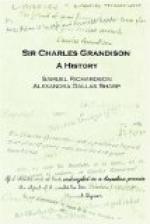But don’t tell Emily that my cousin James Selby is in love with her. That he may not, on the score of the dear girl’s fortune, be thought presumptuous, let me tell you, that he is almost of age; and, when he is, comes into possession of a handsome estate. He has many good qualities. I have, in short, a very great value for him; but not enough, though he is my relation, to wish him my still more beloved Emily. Dear creature! Methinks I still feel her parting tears on my cheek!
You charge me to be as minute, in the letters I write to you, as I used to be to my friends here: and you promise to be as circumstantial in yours. I will set you the example: do you be sure to follow it.
We baited at Stoney Stratford. I was afraid how it would be: there were the two bold creatures, Mr. Greville, and Mr. Fenwick, ready to receive us. A handsome collation, as at our setting out, so now, bespoke by them, was set on the table. How they came by their intelligence, nobody knows: we were all concerned to see them. They seemed half-mad for joy. My cousin James had alighted to hand us out; but Mr. Greville was so earnest to offer his hand, that though my cousin was equally ready, I thought I could not deny to his solicitude for the poor favour, such a mark of civility. Besides, if I had, it would have been distinguishing him for more than a common neighbour, you know. Mr. Fenwick took the other hand, when I had stept out of the coach, and then (with so much pride, as made me ashamed of myself) they hurried me between them, through the inn yard, and into the room they had engaged for us; blessing themselves, all the way, for my coming down Harriet Byron.
I looked about, as if for the dear friends I had parted with at Dunstable. This is not, thought I, so delightful an inn as they made that—Now they, thought I, are pursuing their road to London, as we are ours to Northampton. But ah! where, where is Sir Charles Grandison at this time? And I sighed! But don’t read this, and such strokes as this, to any body but Lord and Lady L——. You won’t, you say—Thank you, Charlotte.—I will call you Charlotte, when I think of it, as you commanded me. The joy we had at Dunstable, was easy, serene, deep, full, as I may say; it was the joy of sensible people: but the joy here was made by the two gentlemen, mad, loud, and even noisy. They hardly were able to contain themselves; and my uncle, and cousin James, were forced to be loud, to be heard.
Mr. Orme, good Mr. Orme, when we came near his park, was on the highway side, perhaps near the very spot where he stood to see me pass to London so many weeks ago—Poor man!—When I first saw him, (which was before the coach came near, for I looked out only, as thinking I would mark the place where I last beheld him,) he looked with so disconsolate an air, and so fixed, that I compassionately said to myself, Surely the worthy man has not been there ever since!




